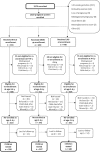Prenatal and postnatal lipid-based nutrient supplementation and cognitive, social-emotional, and motor function in preschool-aged children in Ghana: a follow-up of a randomized controlled trial
- PMID: 30721937
- PMCID: PMC6367954
- DOI: 10.1093/ajcn/nqy303
Prenatal and postnatal lipid-based nutrient supplementation and cognitive, social-emotional, and motor function in preschool-aged children in Ghana: a follow-up of a randomized controlled trial
Abstract
Background: Adequate nutrition is necessary for brain development during pregnancy and infancy. Few randomized controlled trials of supplementation during these periods have measured later developmental outcomes.
Objective: Our objective was to investigate the effects of provision of prenatal and postnatal lipid-based nutrient supplements (LNS) on child development at preschool age.
Methods: We conducted a follow-up study of 966 children aged 4-6 y in 2016, born to women who participated in the International Lipid-Based Nutrient Supplements-DYAD trial conducted in Ghana in 2009-2014, representing 79% of eligible children. Women ≤20 weeks of gestation were randomized to daily LNS or multiple micronutrient (MMN) capsules during pregnancy through 6 mo postpartum or iron and folic acid (IFA) capsules during pregnancy and calcium placebo capsules during 6 mo postpartum. Children in the LNS group received LNS from 6 to 18 mo. Primary outcomes of this follow-up study were (1) a cognitive factor score based on a test battery adapted from several standard tests, 2) fine motor score (9-hole pegboard test), and (3) social-emotional difficulties (Strengths and Difficulties Questionnaire; SDQ). Eight secondary outcomes were calculated in specific domains (e.g., language, SDQ prosocial). Analysis was by a complete case intention to treat in a 2-group comparison: LNS compared with non-LNS (MMN + IFA).
Results: Children in the LNS group had significantly lower social-emotional difficulties z-scores than children in the non-LNS group (adjusted for child age β = -0.12, 95% CI: -0.25, 0.02, P = 0.087; fully adjusted β = -0.16, 95% CI: -0.29, -0.03, P = 0.013). The effect of LNS on social-emotional difficulties score was larger among children living in households with lower home environment scores (P-interaction = 0.081). No other outcomes differed between the 2 intervention groups.
Conclusions: Provision of LNS during the first 1000 d of development improved behavioral function, particularly for children from low nurturing and stimulation households, but did not affect cognition at preschool age in this setting. Trial Registration: clinicaltrials.gov, Identifier NCT00970866.
Figures



